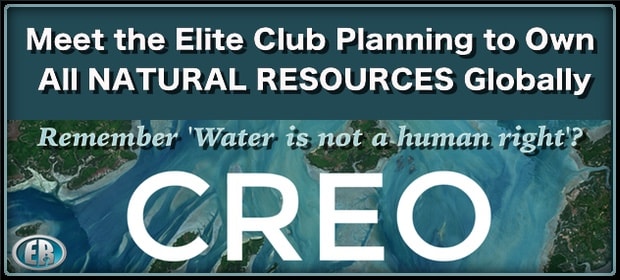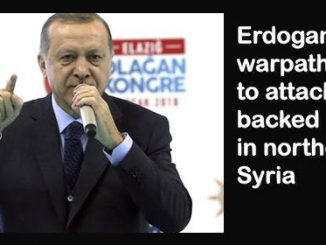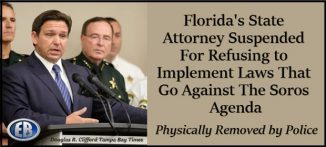
ER Editor: As Zerohedge is drawing its reporting from elite-friendly Bloomberg, the article below all sounds rather innocuous, or philanthropic, or just logical – supremely wealthy families looking for new investment opportunities. It also relies on the fake notion of ‘climate change’. But it’s also about the scooping up and ownership of the natural world for profit and control – and control of us, too, through implanted technologies. All part of Agenda 21.
The rich families’ environmental investment club described below, Creo Syndicate, where you’ll find the word ‘family’ over and over again, has this to say about the natural resource of water, one of the essential elements for all life:
Water is a finite natural resource unlike any other. It is required for life itself and sustains almost every natural and industrial process on the planet. Increasing volatility in water quality and quantity present evolving risks for the planet and for humanity. Addressing the local and global challenges that reduced water dependability and declining water quality pose will require trillions of dollars of new investment. Private capital must play a role in developing, implementing, and scaling solutions to water problems. The universe of available water investments is still nascent, creating opportunities for early movers motivated to create impact. Families, along with their family offices and foundations, are uniquely positioned as catalysts and leaders in the water investments market. Families can deploy solutions-oriented, patient capital across asset classes to deliver impact alongside financial return. This primer maps water investment opportunities and provides several inspiring examples of how families are actively investing to address local and global water challenges.
They pay for it, they own it.
The Covid lockdown tyrannical nonsense has taught us how our governments are engineering this ownership of everything for the elite.
Which puts us in mind of Peter Brabeck-Letmathe, CEO of Nestle who infamously argued in a video that it’s ‘extreme’ to regard water as a human right (see Nestle CEO: water is not a human right, should be privatized):
The Former CEO of Nestle claims that water is not a human right and that it should be privatized and controlled.
Peter Brabeck-Letmathe, the now Chairman of one of the biggest corporations and the largest food product manufacturer in the world, believes corporations should own all the water on the planet, and no one should be allowed to have access to it unless they pay.
He also states that GMOs have never caused illnesses despite hundreds of independent studies showing otherwise.
For the word ‘sustainable’ we can substitute ‘elite-controlled’.
********
Secretive Club For Ultra-Wealthy Environmentalists Revealed
Ultra-wealthy investors looking to direct vast sums of money into green investments (perhaps to atone for ‘climate sins’) have been joining in a secretive nonprofit dedicated to ‘speeding up the flow of capital into investments that can slow global warming,’ according to Bloomberg.

The club, Creo Syndicate, works with around 200 families who pay a ‘very reasonable’ flat fee to join, and must commit to making their first investment in climate and sustainability within six months, according to founder and director, Régine Clément.
Creo’s members include investor Jeremy Grantham and Nat Simmons – the son of Renaissance Technologies’ billionaire founder James Simmons. According to the report, “Part of building trust with wealthy families is keeping their secrets. In addition to Grantham and Simons, the group’s ranks include other well-known billionaires whose names Creo won’t disclose. A mantra is “no tourists allowed.”
“This is not philanthropy, this is investment,” said Clément, adding “We grow entirely through introductions. We never seek out a family.”
Creo currently has over $800 billion under management, according to the report.
Acting essentially as a mini-investment bank, the nonprofit vets approximately 300 deals per year – connecting member investors with potential partners, while researching technologies for future investments. And because Creo makes no fees on any deals, and ultra-wealthy families ‘generally aren’t trying to pitch to each other,’ “There’s not a lot of hidden agendas.”
“Members have invested in everything from batteries and hydrogen fuel to regenerative farmland and greener product packaging. Portfolios include still unproven technologies such as methods for carbon capture and true long shots like fusion reactors.”
The key to Creo’s success, members say, is how it gets very wealthy investors in the same room—or on the same Zoom call. “You have people with a decade of experience and people with a month of experience,” says longtime member Reuben Munger, a hedge fund manager who founded Vision Ridge Partners as his family office and later turned it into an investment firm. With more than $1 billion under management, it specializes in sustainable assets. –Bloomberg
Those interested in joining Creo must have assets of at least $100 million and pass a board approval process. The investments aren’t mainstream, however according to Spring Lane Capital managing director Christian Zabbal, co-chair of Creo’s board, “It’s fine, because these families are comfortable being pioneers,” adding “What Creo is doing today is essentially a preview of what institutional capital will do very shortly.”
Creo members make a wide variety of bets that might make a difference—and make money…
…
Superwealthy families, [says Clément], have an advantage over other players: Managing money for future generations, they can afford to wait a decade or more for investments to bear fruit. Some members in Europe have been rich for hundreds of years. Families “are naturally inclined to think long term,” she says. –Bloomberg
In four years, the nonprofit’s membership has grown by 400%, and affiliates’ assets have risen eightfold – starting with less than $100 billion in 2016. Growth has been so explosive that Creo has had to double its staff in the past year; 10 in the US and two in the UK. The nonprofit has tried to attract even more capital by approaching large institutional investors who want to participate in green investments, such as CDPQ, a Quebec-based pension fund with $333 billion in assets that has launched a $500 million climate and sustainability strategy.
One family participating in the fund is France’s Mulliez family – which owns a global retail empire worth over $38 billion. Family members decided they wanted to ‘take climate change more seriously’ when it came to their investment portfolio, so they directed their Delphine Descamps, managing director at the Mulliez family office (which invests around $236 million per year) to explore options.
“This space is very broad, and it’s complicated,” said Descamps.
The Mulliez family owns a giant supermarket chain, Auchan—basically France’s answer to Walmart. Their conversations with other Creo members led to a decision to concentrate on food in their climate-focused portfolio. Agriculture accounts for about 10% of global greenhouse gas emissions, and better farming practices could fight climate change by both reducing pollution and sequestering more carbon in soils. Sustainable forms of aquaculture, meanwhile, could satisfy demand for protein with far less pollution than other kinds of meat. The family invested in Gotham Greens, an indoor urban farming company, and two companies involved in aquaculture: Kingfish Zeeland, which runs high-tech fish farms, and InnovaFeed, which raises insects as feed for farm-raised seafood.
This year the Mulliez family office led a fundraising round for Hungry Harvest, a startup that sends consumers weekly boxes of produce. When Descamps asked Creo if it knew of any other mission-driven investors looking for deals focused on reducing food waste, she was introduced to Quadia, a Geneva-based impact investor that helped close the $13.7 million investment round in September. –Bloomberg
Another board co-chair, Jason Scott, says that wealthy families want to “be at the front of the parade,” and scoffs at the thought that investing in green technologies is becoming a bubble. “You’re talking about changing the way food is grown and transported and what people eat, how energy is delivered to people’s homes, what people drive, the way people build cities,” he said, adding “You’re talking about a complete reconfiguration of the global economy.”
Creo was formed in 2016 after two climate-focused investor networks merged. It was originally an informal gathering for like-minded families. “People would throw down their credit cards for dinner. It was pretty low-rent,” said Scott, adding that Clément had “turned it into a powerful platform.”
Some of Creo’s investments have paid off big, such as Beyond Meat, Tesla, and battery tech company QuantumScape, which was recently valued at $3.3 billion.
“The opportunities are tremendous, but it’s also overwhelming for someone who starts out,” said Zabbal. “By investing in collaboration with others who bring expertise, it allows more investors to take the leap.”
************
Source

••••
The Liberty Beacon Project is now expanding at a near exponential rate, and for this we are grateful and excited! But we must also be practical. For 7 years we have not asked for any donations, and have built this project with our own funds as we grew. We are now experiencing ever increasing growing pains due to the large number of websites and projects we represent. So we have just installed donation buttons on our websites and ask that you consider this when you visit them. Nothing is too small. We thank you for all your support and your considerations … (TLB)
••••
Comment Policy: As a privately owned web site, we reserve the right to remove comments that contain spam, advertising, vulgarity, threats of violence, racism, or personal/abusive attacks on other users. This also applies to trolling, the use of more than one alias, or just intentional mischief. Enforcement of this policy is at the discretion of this websites administrators. Repeat offenders may be blocked or permanently banned without prior warning.
••••
Disclaimer: TLB websites contain copyrighted material the use of which has not always been specifically authorized by the copyright owner. We are making such material available to our readers under the provisions of “fair use” in an effort to advance a better understanding of political, health, economic and social issues. The material on this site is distributed without profit to those who have expressed a prior interest in receiving it for research and educational purposes. If you wish to use copyrighted material for purposes other than “fair use” you must request permission from the copyright owner.
••••
Disclaimer: The information and opinions shared are for informational purposes only including, but not limited to, text, graphics, images and other material are not intended as medical advice or instruction. Nothing mentioned is intended to be a substitute for professional medical advice, diagnosis or treatment.





